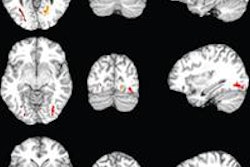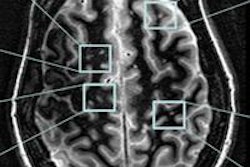MRI showed that the distribution of white-matter brain abnormalities in some patients after mild traumatic brain injury (TBI) closely resembled conditions found in early Alzheimer's dementia, in a study published online June 18 in Radiology.
Researchers from the University of Pittsburgh studied data from diffusion-tensor MRI (DTI-MRI) exams performed on 64 patients with mild traumatic brain injury and 15 control patients. Their goal was to determine if there was a relationship between white-matter injury patterns and the severity of postconcussion symptoms in patients with mild TBI who had normal findings on conventional MRI exams.
The mean age of the patients with mild traumatic brain injury was 17 years, and 42 (66%) were men. Sports injury was the reason for concussion in two-thirds of the patients.
All patients underwent neurocognitive evaluation with Immediate Postconcussion Assessment and Cognitive Testing (ImPACT). The researchers analyzed any correlation between fractional anisotropy values, the ImPACT total symptom score, and findings of sleep-wake disturbances.
"Sleep-wake disturbances are among the earliest findings of Alzheimer's patients and are also seen in a subset of mild traumatic brain injury patients," noted lead author Dr. Saeed Fakhran, assistant professor of radiology in the division of neuroradiology. "Furthermore, after concussion, many patients have difficulty filtering out white noise and concentrating on the important sounds, making it hard for them to understand the world around them."
The results showed a significant correlation between high ImPACT total symptom score and reduced fractional anisotropy at the gray-white junction, most prominently in the auditory cortex. Significantly decreased fractional anisotropy was found in patients with sleep-wake disturbances in the parahippocampal gyri relative to patients without sleep-wake disturbances.
The results suggest that the problem facing concussion patients may not be the injury itself, but rather the brain's response to that injury, according to Fakhran. In addition, the neurodegenerative changes are similar to those seen in early Alzheimer's dementia.



.fFmgij6Hin.png?auto=compress%2Cformat&fit=crop&h=100&q=70&w=100)




.fFmgij6Hin.png?auto=compress%2Cformat&fit=crop&h=167&q=70&w=250)











